Dental Prosthetist – The Definitive Guide!
With all the different names for dentists and dental specialists out there on the internet, it is easy to get confused.
So, what does a Dental Prosthetist do?
Dental prosthetists are independent practitioners, who are registered to:
- Manufacture plaster and wax models of your mouth and teeth, using these to make dental appliances including mouthguards to be used in sporting activities, and dentures.
- Maintain, mend, and replace the lining on dentures as necessary.
- Personally consult, advise and aid you on all details of your prosthetic treatment.
Today we’ll discuss when you need to see a prosthetist, what qualifications they have, and whether your general dentist can perform the same role.
Lastly, we’ll cover what it costs for a prosthetist to provide you with mouthguards or dentures.
We’ll get straight into it.
Quick note – All information in his post has been referenced by a dental professional and is intended for informational and educational purposes only. We do not know your individual circumstance and It is advisable and recommended to seek direct advice and consultation with your dentist
When Do You Need to See a Prosthetist?
If you have missing or teeth, which is causing you trouble when chewing food or talking, you may have been advised that you need something called “prosthetics”.
A prosthetist has the ability to manufacture replacement teeth after your own teeth have been removed.
This can involve single teeth, multiple teeth or full arch tooth removal.
They can look at your mouth and teeth, discuss your lifestyle and needs, and assess whether you require dental appliances, such as:
- Dentures – This could be a full mouth of new teeth (full dentures), or a few missing teeth replaced (partial dentures).
- Splints or nightguards, sleep apnea or anti-snoring instruments, or
- A mouthguard for the sports that you play.
A prosthetist has been trained to create all of these appliances personally.
When providing dentures, they can attach them, maintain them, and provide every other professional denture care service, such as repairing and relining them, while consulting with you directly.
They will also liaise with the practitioner who referred you, so all lines of communication are kept open.
If getting dentures, you will have to revisit for regular care and maintenance every year.
This is to have a check-up and to have your dentures relined.
Your dentures will need to be relined roughly every 5 to 10 years.
They will also need replacing in full in about the same period of time.
This is dependent on the number of teeth missing and your lifestyle and wear habits.
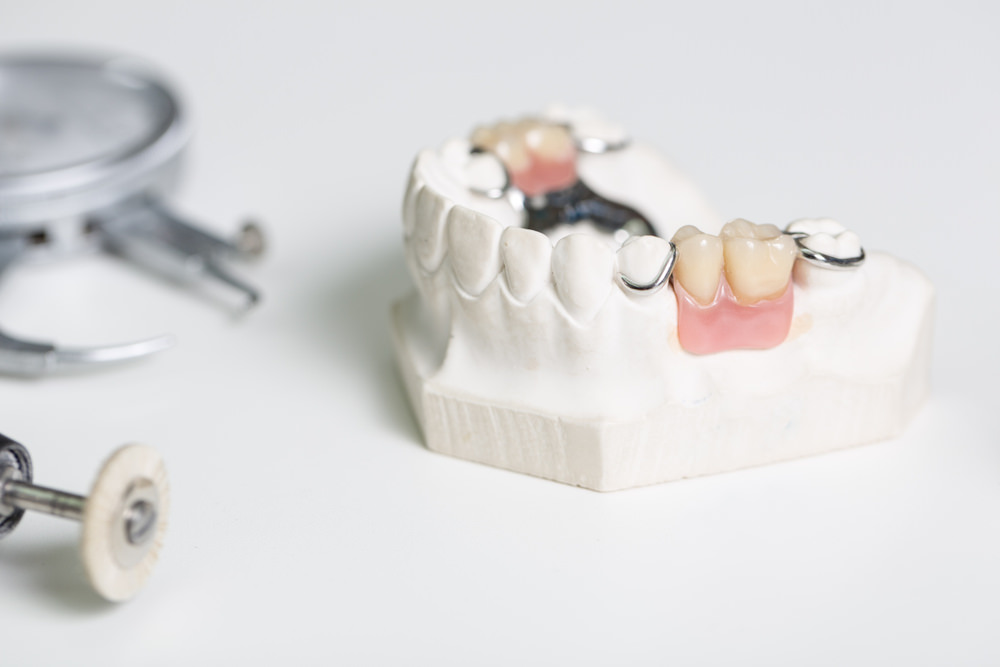
Prosthetists create dental appliances such as partial dentures.
What Qualifications Do Prosthetists Have?
Prosthetists start their careers as dental technicians.
To become a dental technician, a minimum grade qualification is a 2-year Diploma of Dental Technology.
Or, another option is for them to work as a Dental Laboratory Assistant.
The requirements of this are completing a Certificate III in Dental Laboratory Assisting.
Now qualified as a dental technician, they typically work in a laboratory.
A dentist will supervise and guide them for another 2 years while they manufacture, modify, or fix a number of oral appliances that are designed to replace or restore teeth, such as dentures, retainers, or mouthguards.
After they have concluded their supervision in a laboratory, the next requirement is completing either an Advanced Diploma in Dental Prosthetics or a Bachelor of Oral Health in Dental Prosthetics.
Before practicing as a dental prosthetist, they must then register with the Dental Board of Australia.
This involves completing at least 60 hours of Continuing Professional Development (CPD) activities over the course of 3-years and complying with all the codes and guidelines as stipulated by the Dental Board of Australia.
Meaning, from here on, they can only work in the position for which they have been educated and trained – that is, a dental prosthetist.
Once registered, they are fully qualified and can consult directly with patients.

A dental prosthetist working away in the lab.
Can a Dentist Perform the Same Role?
As this post of mine discusses, your general dentist can perform all of the same procedures as any specialists, or independent practitioners, including prosthetists.
The difference is that your dentist may not have carried out all the additional years of education that the prosthetist did.
So they could qualify and register in the field of prosthetics.
Or your dentist may simply want to refer you directly to a prosthetist to cut down on the costs for your dentures.
A prosthetist has a high level of knowledge, skills and abilities.
But these have been based around one specific area of dentistry.
Whereas a dentist has years of hands-on experience, in every part of dentistry.
Remember, they were actually the ones who supervised and gave some guidance to the prosthetist when they were a dental technician.
So, a general dentist can perform the same role as a prosthetist.
They can provide you with the dentures you need, fitting them to your mouth.
If your dentures no longer fit, you can see your dentist, and they can advise you if they need relining or replacing.
Again, there is a slight difference here.
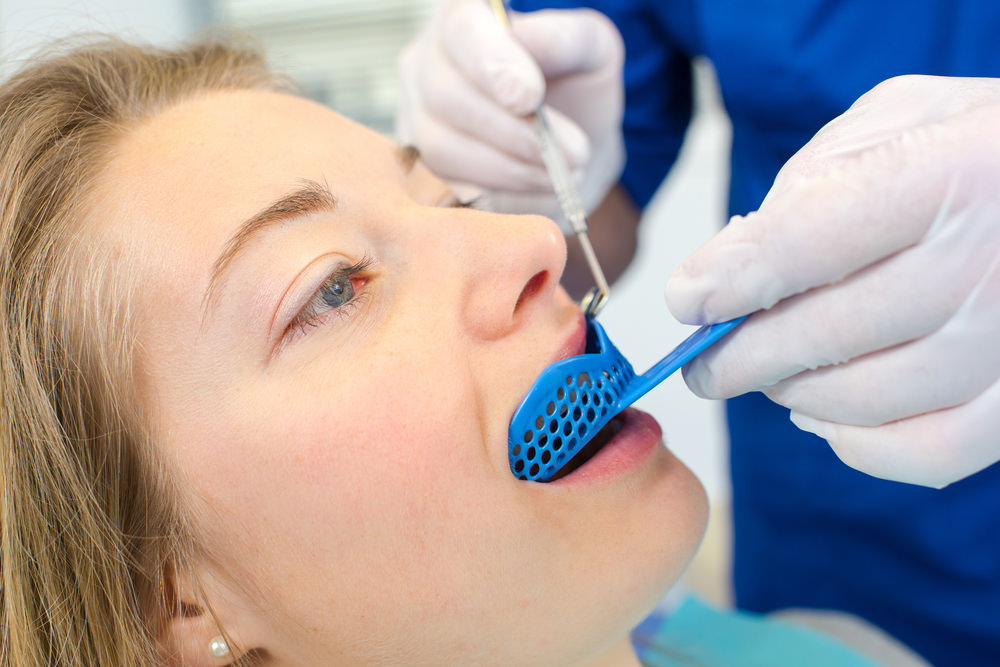
A dentist taking an impression of a clients teeth.
The dentist does not make the dentures themselves as a prosthetist does.
A dentist will take a wax impression of your mouth, and then send this to their dental laboratory.
At this point, a dental technician will design your dentures, and send them back to your dentist, who can fit than them for you.
Or, if your dentures need relining, a dentist will still be able to tell just by looking at your mouth.
Very often, they can reline your dentures in their very own office, but this is only if a small adjustment is required.
If a large adjustment is required to how the denture fits in your mouth, they may need to send it back to their technician at their laboratory, so the relining can be done there.
What this means is that you would have to go without your dentures for several days.
So, if you choose a prosthetist, you would be cutting out the middle man as such, as they complete this work themselves.
In regards to every other service a prosthetist does, your dentist can do these themselves, because they can make the impressions of your mouth.
So, your dentist can also make you a custom-made mouthguard.
If you grind your teeth, snore, or have sleep apnea, this is a great option.
Dental Prosthodontist – A Specialist
I will also make a note and advise you that there is a dental specialist called Prosthodontists.
These are dental specialists who first train as a dentist but take on further study in all aspects of dental works.
Such as crowns, veneers, implants, occlusion, Tempro Mandibular Joints (TMJ), dentures and a full array of any restoration in the mouth.
The specialist is much more expensive due to their specialized nature for complex dental restorations.
Cost to See a Prosthetist for Mouthguards
Typically, when seeing a prosthetist, you can expect to pay less than when seeing a dentist depending on the skill set and area of the clinician.
This is due to several things.
Firstly, the dental professional themselves, where they are located, the rent they are paying, whether they are a corporate dentist or owned by a health fund, how many staff they have, their economic situation, and so on.
There is a wide range of prices that you will see if you hunt around for a custom-fitted mouthguard.
If you visit a dentist, you can expect to pay between $80 – $150 for your mouthguard.
However, if the dentist sends your job out to a laboratory then the cost must be accounted for.
For example, I called a prosthetist in Perth, Western Australia.
The price I was given that they charge for making you a mouthguard was $220.
They were also extremely busy – they were booked out 2 weeks in advance.
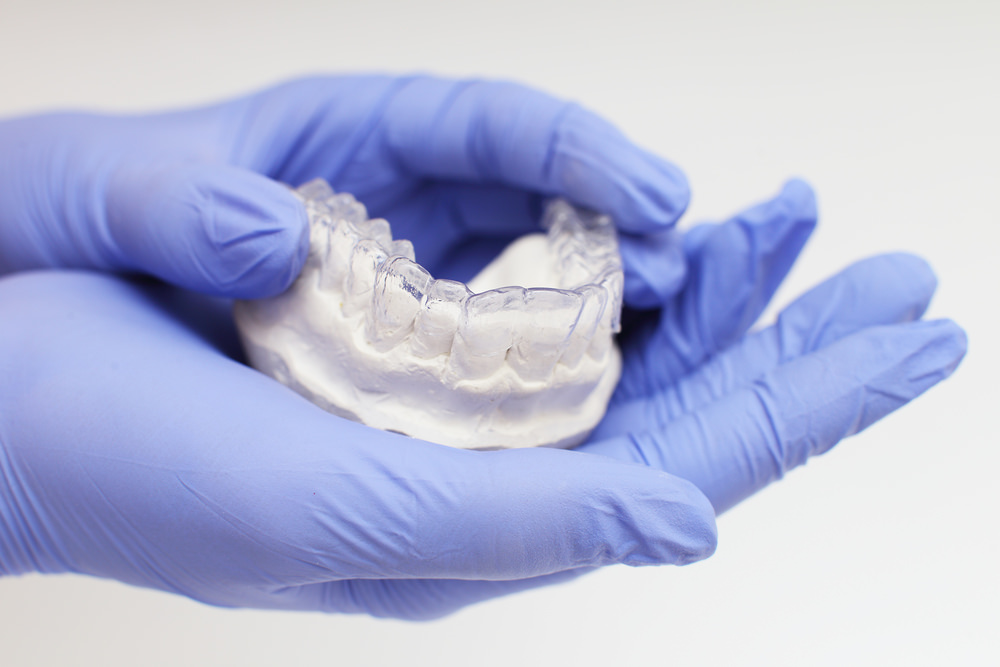
A professional dental mouthguard.
Cost to See a Prosthetist for Dentures
The cost of dentures is dependent on several factors.
Such as the type of denture, the materials that are used to manufacture them, where you live in Australia.
How many teeth that you have remaining which may need to be removed is also a consideration
I contacted a prosthetist in Perth, Western Australia, for their price on dentures.
I was advised that these can range from $1200 to $4000 for a prosthetist with 30 years of experience.
For a more precise but obligation free quote, it would be advised that you make an appointment at their clinic.
That way they can perform an accurate assessment of your teeth.
This price for a prosthetist to provide you with dentures is compared to the average price range of between $1300.00 – $1323.89 for a dentist in Western Australia, as you can see on our Dental Cost Calculator.
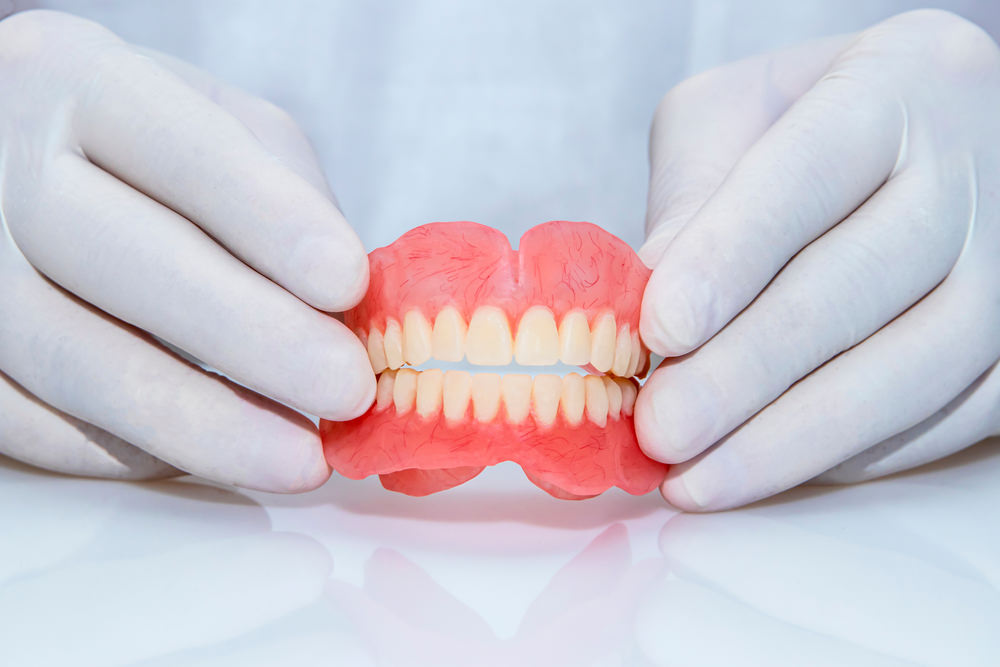
A full set of dentures that a Dental Prosthetist created.
Conclusion
A prosthetist has several years of training in the field of prosthetics.
Basically, they deal with prosthetics of the mouth and are skilled at creating and manipulating dentures and mouthguards.
They can also personally consult with you on all details of your ongoing treatment, such as maintaining, mending and relining your dentures.
But while a prosthetist has a lot of knowledge in this field, and a great eye for the treatments, your general dentist can perform all of these same treatments.
So, if you need prosthetics, is it better to see your dentist or a prosthetist?
Your dentist is always the first person you should call.
They already know you and your mouth.
They may have been the ones who removed those missing teeth and will be able to give you suggestions as to your options and are less costly.
So, if you are comfortable with your dentist, and trust their knowledge, it’s a good idea to keep seeing them.
If your problems become more complex, then it may be time for you to visit a prosthetist.
Though a referral is not necessary, your dentist can give you a referral to see the best prosthetist in your region, guiding you to see the most trustworthy person for that issue.
When the time is right, if they cannot perform the work that needs performing for any reason, they will ensure that you are safe by referring you to see a prosthetist.
Do you have questions about dentures or prosthetics? Leave a comment below and Dr V will answer it!
By Anthony Cade
Created at October 01, 2021, Updated at January 25, 2025
Sorry, the comment form is closed at this time.


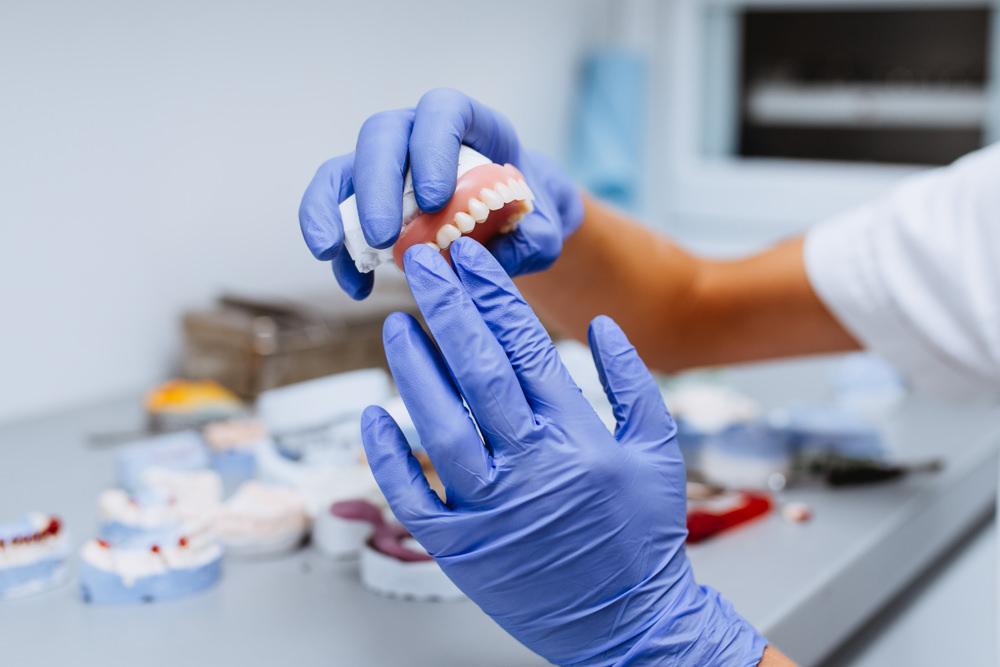
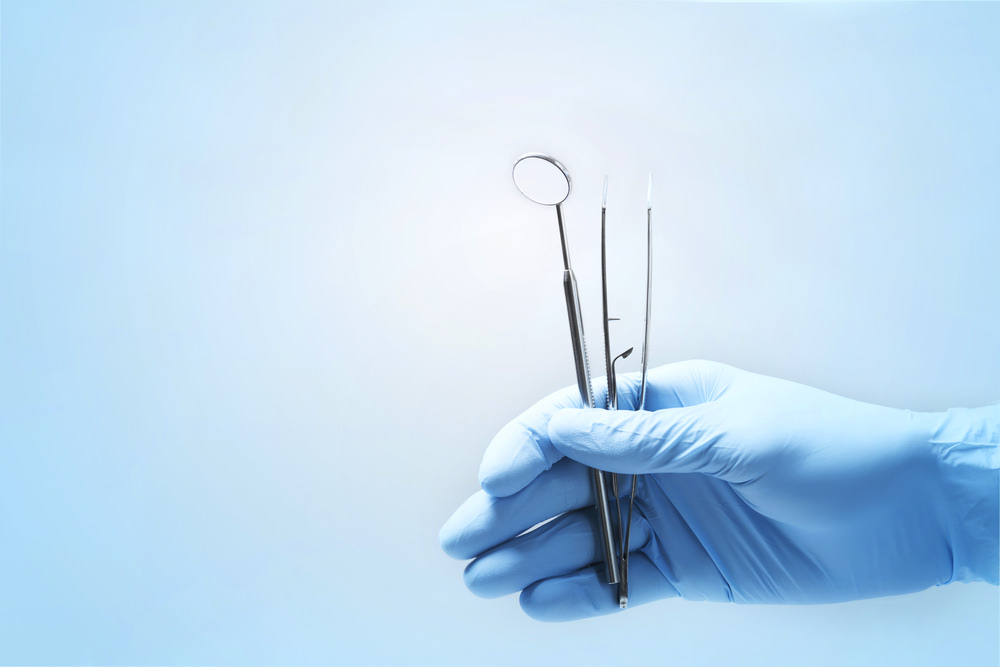

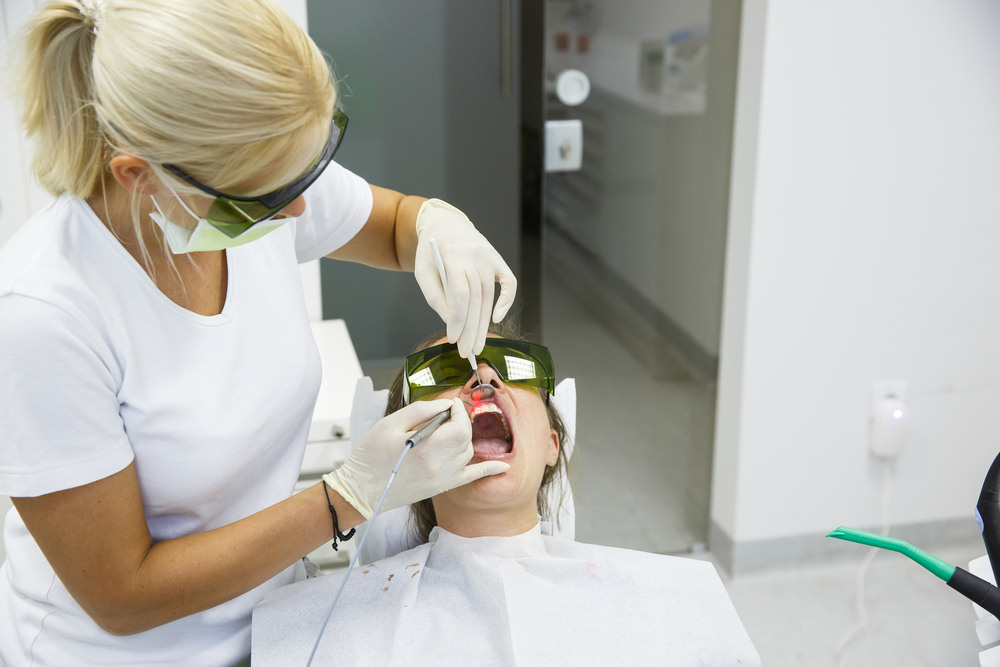
Zdenek Jaskula2 years ago
Hi.
What is best material used for denture.
What is kvality off acrilic.
Thank you.